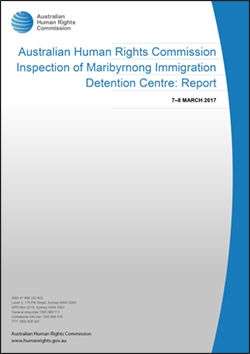Inspection of Maribyrnong Immigration Detention Centre

- DIBP response to MIDC inspection report
Summary of key issues
The current risk assessment process may not allow for an accurate or appropriate determination of the risks posed by particular individuals, with the result that they may be subject to more restrictive measures than necessary.
The lack of clarity about the risk assessment process is also a significant source of confusion and frustration.
The use of restraints during escort may have at times been excessive.
Certain aspects of the transfer process are unjustified, particularly in relation to the lack of prior warning of transfers and lack of adequate opportunities for people to pack their belongings and notify family members, friends and legal representatives prior to the transfer.
The implementation of a ‘controlled movement’ policy at the MIDC has had a significant impact on living conditions, freedom of movement and access to facilities, given the significant differences between conditions in each compound.
Current accommodation facilities at the MIDC are not suitable for groups of three to four people, as they do not afford sufficient space or privacy for groups of this size.
Indoor and outdoor exercise facilities at the MIDC may not be adequate, particularly in Zones D and E which have limited outdoor space and shade.
Some expressed concern that activities were not sufficiently engaging and meaningful, particularly in relation to education. The lack of opportunities for excursions is concerning, particularly in light of the limited space for outdoor recreation at the MIDC.
The new policy prohibiting all mobile phone use may restrict access to external communication to a greater degree than is necessary to ensure safety and security.
Current restrictions on visits may limit access to visits to a greater degree than is necessary to ensure safety and security.
While most of the people interviewed by the Commission team indicated that they had been in detention for six months or less, a significant number reported that they had been detained for far longer periods, in some cases for well over a year.
Consideration of community alternatives does not occur on a systematic basis for all people in detention, particularly for people who have had visas cancelled under section 501 of the Migration Act. In some cases, ongoing detention may not have been justifiable in the circumstances.
The reduction in the scope of the case manager role and its present limitations lead to a mismatch between the types of support that case managers can provide to people in detention, and the types of support that people in detention actually need, including to resolve their status.


